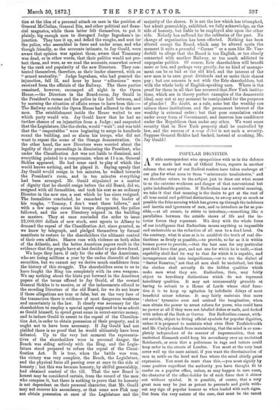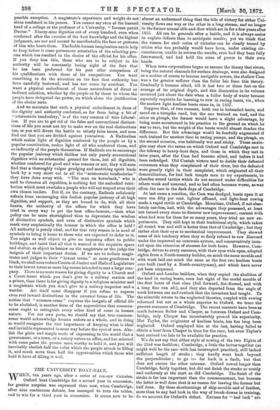POPULAR DIGNITIES.
AN able correspondent who sympathizes with us in the defence we made last week of Official Dress, reports in another column that many of our Radical readers have taken umbrage at
our plea for what seem to them "aristocratic tomfooleries," and we therefore return to the subject just to draw out what seems to us the extreme weakness and danger of that conventional but quite indefensible position. If Radicalism has a central meaning, we take it that that meaning is the desire to get at the root of all true social and political distinctions, to sweep away as much as possible the false seeming which has grown up through the indolence and inertia and ignorance of men, and to introduce as far as pos- sible,—at all events, to strive to introduce,—something like a parallelism between the outside shows of life and the in- terior forces they represent. We deny with the whole force of our intelligence that Radicalism means anything so impossible and undesirable as the reduction of all men to a dead level. On the contrary, what it aims at is to establish the truth of real dis- tinctions as firmly as possible,—to provide, so far as it is within human power to provide,—that the best man for any particular post shall have that post, and not one for which he is unfit,—that capability shall find its way to that for which it is capable, and incompetence sink into insiguificance,—or to use the dialect of "Sartor Resartus," not that all men shall be unclothed, but that the clothes shall actually fit the hidden qualities which make men what they are. Radicalism, then, may fairly object to hereditary distinctions which do not represent hereditary qualities. It may not unreasonably grumble at having to submit to a House of Lords whose chief func- tion it is to keep up agitation by indefinite delays of most beneficial minor reforms. It may fairly maintain that mere
'clothes' tyrannize over and mislead the imagination, when men obtain the power to arrest reform for years, who could have
no power at all if they were not labelled dukes or earls, and decked with orders of the Bath or Garter. But Radicalism cannot, with- out suicide, object to fitting official symbols for popular dignities, unless it is proposed to maintain what even Herr Teufelsdrockh and Mr. Carlyle shrank from maintaining, that the mind is so com- pletely independent of its manner of impersonation, that an unclothed Bismarck could keep his ascendancy over an unclothed Reichsrath, or even that a policeman in rags and tatters could keep order in the streets of London. You must at the very least cover well up the mere animal, if you want the discrimination of men to settle on the head and face where the mind chiefly gains expression. You must do more than this,—you must signify by some positive expedient the authority you have thought fit to
confer on a popular office, unless, as may happen in rare cases, the character of the office-holder be of such force that it shines out without symbol. It is possible, of course, that a very great man may be just as potent to persuade and guide with- out any sign of popular honour as when loaded with such signs. But from the very nature of the case, that must be the rarest
possible exception. A magistrate's experience and weight do not shine confessed in his person. You cannot say even of the learned head of a college or the professor of a University, " Incessu patuit Doctor." Ninety-nine dignities out of every hundred, even when conferred after the exercise of the best knowledge and the highest judgment, are not and cannot be manifested in the face or gestures of him who bears them. The feeble human imagination needs help to keep before it some permanent attestation of the selecting pro- cess which has resulted in the choice of the official for his office. If you deny him this, those who are to be subject to his authority will be constantly losing sight of the fact that he has been preferred for his post after comparison of his qualifications with those of his competitors. You want something to fix the attention on the fact that authority has been carefully bestowed, and has not come by accident. You want a physical embodiment of those antecedents of direct or indirect selection, whether by the people or by those to whom the people have delegated the power, on which alone the justification of the choice rests.
And we maintain that such a physical embodiment in dress of the dignity and authority conferred, so far from being a bit of "aristocratic tomfoolery," is of the very essence of wise Liberal- ism. If you are to get rid of the false and conventional distinct- tions of life you must not try to make war on the real distinctions too, or you will divert the battle to utterly false issues, and soon find out that you are divided against yourselves. A Radicalism which makes light of dignities conferred by the people or by a popular constitution, makes light of all who conferred them, and so indirectly of the people themselves. If Radicals are to encourage the popular jealousy which dislikes not only purely conventional dignities with no substantial ground for them, but all dignities, whether conferred for good and wise reasons or not, they will soon find that a thoroughly vulgar grudging and snatching spirit leads back by a very short cut to all the "aristocratic tomfooleries" they have done away with. "The man on horseback," who is said to threaten all republics, is nothing but the embodied retri- bution which must overtake a people who will not respect even their own chosen leaders. But if, on the contrary, Radicals sedulously refrain from encouraging this foolish popular jealousy of all high dignities, and support, as they are bound to do, with all their hearts, the authority of the offices for which they have tried in every way to get the best office-bearers,—then what policy can be more shortsighted than to depreciate the wisdom of distinctive symbols, and even of distinctive symbols which mark very emphatically the honour in which the office is held ? All authority is purely ideal, and for that very reason is in need of symbols to bring it home to those who are expected to defer to it. You might as well object to give an imposing effect to public buildings, and insist that all that is wanted is the requisite space and shelter, as object to bestow on the magistrate or the judge the insignia of their important duties. If we are to reduce magis- trates and judges to their "lowest terms" as mere gentlemen in black, we shall soon reduce Courts of Justice and Halls of Legislature to their lowest terms as mere big rooms intended to seat a large com- pany. 'There is no more reason for giving dignity to a Church and a Court-house which you don't give to a railway station and a prison, than there is for giving dignity to a religious minister and a magistrate which you don't give to a railway inspector and a warder. Art itself must disappear if you refuse to express even real inward distinctions in the external forms of life. The notion that "common-sense" requires the insignia of official life to be abolished, is another form of the superstition that common- sense ought to extinguish every other kind of sense in human nature. For our own parts, we should say that true common- sense would acknowledge human nature as a whole, and in doing so would recognise the vast importance of keeping what is ideal and invisible represented in some way before the eyes of men. Abo- lish the plain and simple mode of expressing to the world that a government, or a town, or a county values an office, and has selected with some pains the person most worthy to hold it, and you will inevitably abolish half the value which the people attach to filling it, and much more than half the opportunities which those who hold it have of filling it well.



































 Previous page
Previous page